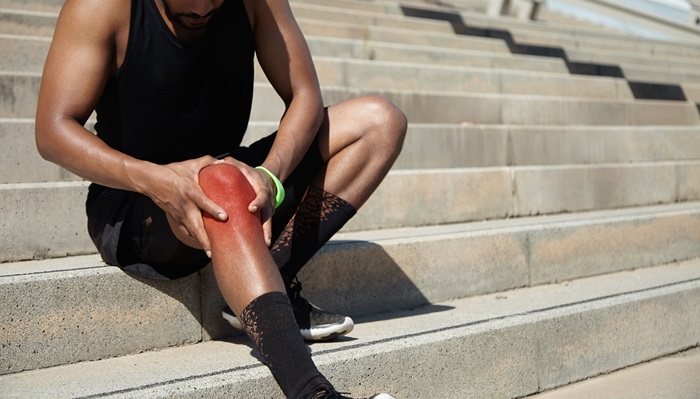An anterior cruciate ligament (ACL) injury is a serious injury that occurs to the ACL inside the knee joint. The ACL is one of the four major ligaments that connect the bones within the knee joint and maintain its stability.
ACL injuries commonly occur during sports or other physical activities involving sudden movements, such as twisting or jumping, which can cause the ligament to tear or rupture.
Contents
Understanding ACL Injury
An ACL injury occurs when the ACL ligament is partially or completely torn. The ACL plays a crucial role in maintaining knee joint stability, especially during movements such as pivoting, jumping, or running.
This injury is often experienced by basketball and soccer players. When it occurs, a sound like something breaking or tearing may be heard. Following this, symptoms such as knee swelling and pain may be felt.
Recovery from this type of injury can vary depending on its severity. Treatments may include surgery and physical rehabilitation to restore knee function.
Symptoms of ACL Injury
Common symptoms of an ACL injury include:
- Severe pain inside or around the knee joint.
- Rapid swelling in the knee area.
- Difficulty bending or fully straightening the knee.
- A sensation of looseness when using the knee to support the body.
Risk Factors for ACL Injury
Several risk factors may increase the likelihood of an ACL injury, including:
- Engaging in high-intensity sports without adequate warm-up.
- Unstable body positioning or incorrect posture during sports movements.
- Genetics; some individuals have ligament structures more susceptible to injury.
- Participating in sports involving sudden movements and knee joint rotation, such as soccer, basketball, or skiing.
- Landing with incorrect foot positioning after jumping.
Diagnosis of ACL Injury
Diagnosis of anterior cruciate ligament (ACL) injury typically involves physical examination and additional testing to ensure an accurate diagnosis. Here is additional information regarding ACL diagnosis:
1. Physical Examination
- Past injury history: the doctor will inquire about previous injuries and symptoms experienced, as well as activities performed at the time of injury.
- Knee examination: a physical examination aimed at checking the level of stability, range of motion, and sensitivity around the knee joint.
- Lachman Test: This is a direct examination test used to assess ACL ligament stability. The doctor will pull the bone under the knee joint forward to determine the extent of ACL ligament stretching or rupture.
2. Additional Tests
- Doctors may perform an MRI (Magnetic Resonance Imaging) examination to obtain a more detailed view of ACL ligament damage and other structures within the knee joint.
- Sometimes, X-rays or CT scans are also performed to evaluate bone damage or other structures around the knee joint.
Meet our Orthopedic Surgeon with Specialties in Hip and Knee
Treatment for ACL Injury
When an injury first occurs, you can administer first aid using the RICE (Rest, Ice, Compression, and Elevation) method.
- Rest: Rest the injured knee and avoid placing too much weight on it, such as by limiting stair climbing or walking.
- Ice: Applying ice can help reduce swelling and pain.
- Compression: Wrap the injured knee with a brace or bandage to apply pressure to the area, allowing for recovery.
- Elevation: Position the knee higher than the floor or mattress by propping it up with a pillow.
Afterward, you should promptly visit an orthopedic specialist for further treatment. Recommended treatments for addressing this condition may include:
1. Physical Rehabilitation
Treatment for this ligament injury begins with physical rehabilitation. Rehabilitation nurses will assist patients in performing exercises to strengthen the knee. Additionally, doctors may instruct patients to use braces or crutches during the recovery period to alleviate knee stress.
The main goal of rehabilitation is to reduce pain and swelling while restoring knee function and movement to optimal levels.
2. Surgery
Not everyone who experiences an ACL injury will require surgery. Surgery is usually recommended if:
- You are an athlete or wish to resume sports activities involving jumping or pivoting.
- Multiple ligaments are torn or cartilage in the same knee is also damaged.
- The injury prevents you from performing simple daily activities.
During ACL surgery, the doctor will remove the damaged ligament and replace it with tendon or other tissue similar to the ligament to connect the muscle and bone.
After surgery, you will still need to undergo physical rehabilitation until knee function is fully restored.
The recovery process for an ACL injury typically takes between 6-9 months, but it can be longer depending on its severity. For athletes planning to continue their careers after injury, recovery usually takes longer to prevent a recurrence of similar incidents.
See Also: Patient Experience doing ACL surgery at Mandaya Royal Hospital Puri
Preventing ACL Injury
To prevent ACL injuries, here are some steps that can be taken:
- Perform adequate warm-up before exercising to increase flexibility and reduce the risk of injury.
- Strength and balance training to strengthen the muscles around the knee joint and improve stability.
- Use protective gear such as knee braces or ligament protectors when engaging in high-risk sports.
- Learn proper techniques for sports movements to avoid positions that may increase the risk of injury.
- Get enough rest and pay attention to signs of muscle fatigue or tension during exercise.
When to See a Doctor?
Seek medical attention immediately if you experience ACL symptoms. The sooner it is treated, the sooner the healing process can begin.
With a good understanding of ACL injuries and proper preventive measures, you can reduce the risk and maintain the health of your knee joints during physical activity.
Mandaya Royal Hospital is one of the best places to address your ACL injury. At our Orthopedic & Movement Center, you will be treated by bone specialist doctors who work together as a team to achieve maximum healing.
Don’t hesitate to schedule your appointment with a doctor now through WhatsApp Chat, the Book Appointment page, or the Care Doctor app, which can be downloaded from Google Play and the App Store. In addition to appointments, you can also monitor queue numbers and get other complete information there.


